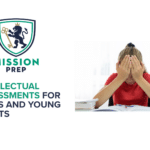Personality Assessments: What They Are & How They Help

While mood swings and shifting interests are part of being a teen, deeper struggles often go unnoticed until they become disruptive. A national survey from Mental Health America tells us that more than 60% of teens with major depression received no mental health treatment at all.¹ In many cases, these symptoms were brushed off as “normal teen behavior” until they grew into crises.
Personality testing can help avoid these crisis situations. Personality tests don’t create definitive profiles about who someone is, but they provide an understanding of a person’s general personality traits. And by doing this, they play an important role in getting to the bottom of how a teen sees themselves. It also uncovers how they see and relate to the world around them. In this way, these mental health assessments provide clarity and direction for treatment.
A personality test can uncover what’s happening beneath the surface and make struggles like narcissism or personality disorder seem a little less overwhelming to manage. When understanding is the basis for care, change and growth can begin to happen.

What Is a Teen Personality Assessment?
Having a personality profile for teenagers you care for can be very helpful when it comes to providing the type of support they appreciate most and respond best to. A teen personality assessment helps us understand:
- Emotional traits
- Behavior patterns
- Social tendencies
Youth personality evaluations may include:
- Self-report questionnaires
- Interviews
- Observer-based evaluations.
At Mission Prep, these evaluations are tailored to each individual and include emotional regulation tests, temperament assessments, and psychological personality typing for youth.
Rather than offering a neat label, personality traits testing in teens use a variety of tools to create a personality profile for teenagers that helps inform diagnosis, treatment plans, and everyday strategies for growth, progress, and support.
Why Is Teen Personality Testing Important?
Sometimes, the signs and symptoms of teen mental health conditions are easy to overlook. Sometimes they’re brushed off as “just a phase.” A teenage identity assessment can help spot the signs early.
As an example, a personality test can help determine the difference between teen social anxiety and shyness. It can also determine the difference between perfectionism and obsessive-compulsive disorder.
Reports by the National Institute of Mental Health uncover that in most cases, early assessment and intervention leads to significantly better outcomes in adolescents with mood or personality disorders, especially when symptoms are first emerging.²
Understanding Teen Identity Through Assessment
Teenagers are in the middle of identity formation. A personality test can’t define them but it can help them begin to understand themselves. This is particularly important for teens who:
- Struggle to express emotions
- Feel confused about their social role
- Bounce between extremes in how they see themselves or others
These are also early signs often found in adolescents who later receive diagnoses for conditions like borderline personality disorder. For that reason, an adolescent personality disorder assessment and borderline personality screening for teens can be a vital step – not for labeling, but for understanding.
Personality Traits and Temperament in Adolescents
Most personality testing for teens looks at five major traits:
- Openness: Also known as “open to experience,” this personality trait involves a willingness to face new experiences and perspectives. It often goes hand-in-hand with curiosity and creativity.
- Conscientiousness: Those scoring high in conscientiousness tend to be very organized, responsible, and goal-directed. They also tend to like rules and boundaries and prefer to stick to these.
- Extraversion: Extraverted young people are typically outgoing and social, and get energized from social events rather than being exhausted by them. They tend to like being around others, often more so than being alone.
- Agreeableness: This personality trait involves being friendly, kind, and compassionate towards others. Altruism and concern for others are also central to this trait.
- Neuroticism: Those high in neuroticism generally show low emotional stability, which makes them more vulnerable to mental health conditions like anxiety and depression. They may also be more prone to stress and self-doubt.
Deeper emotional personality analysis youth assessments go even further beyond the surface. They may also measure behavioral traits in youth like:
- Impulse control
- Social inhibition
- Attention to detail
- Empathy
- Resilience
Adolescent temperament testing helps clinicians understand how a teen handles stress, change, or social pressure. These results are often paired with an emotional regulation test for teens to give a more complete emotional personality analysis.
Introversion, Extroversion, and Emotional Personality Analysis
Introversion and extroversion shape how teens restore their energy, navigate relationships, and cope with stress. Some teens thrive on constant connection. Others need quiet after social interaction like it’s a multivitamin for their nervous system. Neither is better. But misunderstanding these tendencies can lead to burnout, isolation, or anxiety that gets misread as “bad behavior.”
That’s where an introvert/extrovert test for teens can help. A teen personality development test doesn’t pigeonhole teens into categories – they spotlight patterns. You might learn that your extroverted teen isn’t “acting out” but struggling with a lack of stimulation. Or that your introverted teen isn’t “too sensitive” – they’re just maxed out by too many expectations and too little recovery time.
Emotional personality analysis also helps clarify how teens process their feelings. Some bottle everything up; others flood the room with every mood. Testing offers a deeper look at how teens regulate emotion, respond to pressure, and interact with the people around them. The aim is to understand the individual, and often it’s understanding that inspires change.
Personality Disorders in Adolescents
Personality disorders are fairly common in teens. Research found that the prevalence rate for any personality disorder was around 20%, often increasing to 30.4% at follow-up over a 10-year period.³ Personality disorders most commonly diagnosed include:
- Antisocial personality disorder
- Borderline personality disorder
- Obsessive-compulsive personality disorders
Borderline personality disorder (BPD), in particular, is fairly common in teenagers. According to information published in the National Library of Medicine, BPD affects between 0.9% to 3% of individuals under 18.⁴ It’s also worth noting that these percentages could be a little higher, especially as many teens with BPD are misdiagnosed with conditions like PTSD, ADHD, depression, or bipolar disorder where behaviors can overlap.
Early identification and intervention of personality disorders and narcissistic traits in adolescents are crucial. Adolescents with personality disorders are at an elevated risk for major mental disorders and suicidal ideation or behavior during early adulthood.
Who Should Take a Personality Test?
Personality assessments aren’t just beneficial for teens displaying overt behavioral issues – they can be helpful for any teen looking for clarity and direction. Consider a personality evaluation if your teen:
- Experiences mood swings and struggles to regulate emotions
- Doesn’t form and maintain relationships easily
- Exhibits impulsive or risky behaviors.
- Consistently feels empty or has identity confusion
- Has a family history of mental health disorders
These assessments can provide insights into underlying personality structures, helping to tailor interventions that promote healthier coping mechanisms and interpersonal skills.
What Is the Best Personality Test for Adolescents?
Psychological personality typing youth isn’t a one-size-fits-all thing, so it’s not possible to determine which test is essentially “the best.” It’s important to consider the various tools available and decide which would be best suited to the teen based on the current situation and the severity of the issues they’re navigating.
Some assessments are designed to detect underlying disorders, while others focus more on identifying personality traits and emotional tendencies.
That said, certain tools are used more often in clinical settings. For example, the Minnesota Multiphasic Personality Inventory-Adolescent (MMPI-A) and the Millon Adolescent Clinical Inventory (MACI) are among the most widely used tests in the U.S. for adolescent personality assessment.⁵ Both have strong track records in evaluating behavioral traits and identifying potential clinical concerns in teens.
Other popular tools include the NEO Personality Inventory-3 (NEO-PI-3), which measures five major domains of personality, such as openness, conscientiousness, and emotional stability.
Choosing the right test depends on the referral question – whether a clinician is trying to understand a teen’s social style, emotional regulation, or possible signs of a personality disorder. At Mission Prep, our clinical team tailors the testing approach to fit the teen, not the other way around.
Where to Find Effective Personality Assessments for Teens
At Mission Prep, we offer psychological evaluations specifically designed for teens. We also offer other forms of mental health assessments and diagnosis, including:
Our main aim is to ensure that each teen we work with feels comfortable enough to be open to the process. We understand how challenging it can be to address and navigate mental health concerns and so our approach is kind and empathetic, every step of the way.
Our team only uses evidence-based assessment tools to understand each teen’s personality structure, emotional functioning, and behavioral patterns.
We use the collected data to create personalized treatment plans addressing the unique issues that each teen faces. Our goal is to empower teens with self-awareness and coping strategies that build resilience and encourage personal growth.

Get in Touch With Mission Prep Treatment Center
If you want to support your teen’s mental health and their overall well-being and development, the first step is understanding their personality. At Mission Prep, we’ve worked with many teens, helping them take the next step through our compassionate assessments.
If you want to help your teen overcome emotional and behavioral issues, now is the time to reach out. Contact Mission Prep today at (866) 828 7409 to schedule a consultation.
References
- Mental Health America. (2022). The state of mental health in America 2022. https://mhanational.org/research-reports/2022-state-mental-health-america-report
- National Institute of Mental Health. (2022). Child and adolescent mental health. https://www.nimh.nih.gov/health/topics/child-and-adolescent-mental-health
- d’Huart, D., Steppan, M., Seker, S., Bürgin, D., Boonmann, C., Birkhölzer, M., & Schmeck, K. (2022). Prevalence and 10-year stability of personality disorders from adolescence to young adulthood in a high-risk sample. Frontiers in Psychiatry, 13, 840678. https://doi.org/10.3389/fpsyt.2022.840678
- National Collaborating Centre for Mental Health (UK). (2009). Borderline personality disorder: Treatment and management (NICE Clinical Guidelines, No. 78). British Psychological Society. https://www.ncbi.nlm.nih.gov/books/NBK55399/
- Archer, R. P., & Handel, R. W. (2013). MMPI-A and MACI assessments in adolescent clinical populations: A survey of practices and preferences. Professional Psychology: Research and Practice, 44(4), 256–262. https://www.ncbi.nlm.nih.gov/pmc/articles/PMC4336333/
















